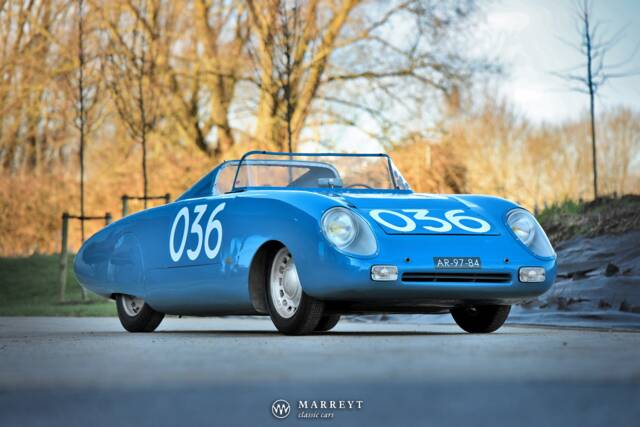- Automobile
- Autobleu
- Autobleu 750 (1 offerta)
Autobleu 750 classic cars for sale
The Autobleu 750 is a niche model from the world of French automotive craftsmen, born out of a collaboration between specialist supplier Autobleu and Renault’s 4CV platform. This compact car captures the innovation of 1950s France, reflecting racing pedigree and customisation trends of its era.
Risultati della ricerca

1954 | Autobleu 750 MM
Prototype - Mille Miglia 1954, 1955 & 1956
Autobleu 750 Classic Cars: Prices & Market Values
History of the Autobleu 750
Autobleu was established post-war in France, carving its name as a boutique manufacturer known for tuning and lightening established Renault models for enhanced performance. The 750 grew out of the popularity of the Renault 4CV, with Autobleu offering engine and bodywork upgrades aimed at enthusiasts who sought a more dynamic, bespoke experience. The firm capitalised on France’s appetite for affordable sports cars by developing the 750, which drew inspiration from both the motorsport scene and the art of coachbuilding. These vehicles were typically built in very limited numbers, adding to their exclusivity on the classic market.
Model History of the 750 Series
The Autobleu 750 took the standard Renault 4CV as its base, applying modifications primarily to the engine, intake manifolds, and exhaust for fresh performance characteristics. This model range was closely linked to French popular racing and rallying in the 1950s, serving as a step between factory cars and pure racing specials. The run of the 750 coincided with the mid-century surge in specialist French automobile makers and concluded once economic and industrial realities reduced the viability of small-scale production in the 1960s.
Highlights of the Autobleu 750
The Autobleu 750 stands apart due to its technical upgrades—many models featured Autobleu’s signature intake manifolds and carburettors, boosting the small engine’s output beyond standard figures. The use of lightweight materials and occasional custom bodywork reflected a performance-first mindset. These cars are a direct link to the French sporting scene, where changes in specification were as much about style as improved lap times.
Technical Data of the Autobleu 750
Special Editions and Collectible Models
Certain Autobleu 750 units were constructed for motorsports use, featuring competition-oriented modifications or one-off coachbuilt bodies. Some surviving examples bear unique histories tied to famous French drivers or racing teams of the day, adding a layer of collectibility. However, production volumes for any 'special' version remain extremely low.
Weak Spots and Common Issues
Due to sparse sources, known weak spots of the Autobleu 750 are generally those found on early post-war French vehicles and the Renault 4CV chassis. Watchpoints include rust-prone subframes, fragile electrical systems, and age-related fuel and brake line deterioration. Additionally, sourcing specific Autobleu-modified parts—such as specialized intake manifolds or custom carburettors—can be challenging, so buyers should assess originality and component condition.
Engine, Performance, Transmission and Handling
Performance improvements on the Autobleu 750 stem from intake and carburettor enhancements, boosting the 4CV’s modest power output. The result is a livelier throttle response, a sportier exhaust note, and better acceleration compared to standard 4CV models. Handling remains faithful to the rear-engine layout, offering nimbleness in city and country driving but requiring skill when approaching the limits. Gearbox and suspension are largely Renault originals, but lighter bodywork gives the Autobleu a distinctive dynamic character. The 4 CV-based 750 models stand out: They represent the entirety of Autobleu’s listed classics in this market. Buyers favour these for both their period upgrades and their connection to early French automotive sport.
Interior, Comfort, Exterior and Design
Design-wise, the Autobleu 750 highlights the craft of post-war French coachbuilders. Exteriors often feature bespoke grilles, badgework, and subtle body modifications. Interiors maintain a spartan, purposeful look typical of sporting cars of the time, but may include upgraded trim or unique steering wheels. Accessories and optional extras were owner-specified, including performance gauges or lightweight bucket seats. Paintwork and materials can vary widely, reflecting the individual character of each example.
Other Features
Some Autobleu 750 cars were sold to privateers for hillclimbs and rallies, creating unique survival stories. Documentation, period photographs, and original invoices can enhance a car’s value and appeal, especially when confirming provenance.
Summary
The Autobleu 750 captures a unique period in French automotive history, where specialist firms transformed the humble 4CV into a compact sports car. With authentic upgrades, provenance, and an unmistakable link to 1950s custom culture, these vehicles offer a precise and rare driving experience rooted in French motorsport and artisanal engineering.
